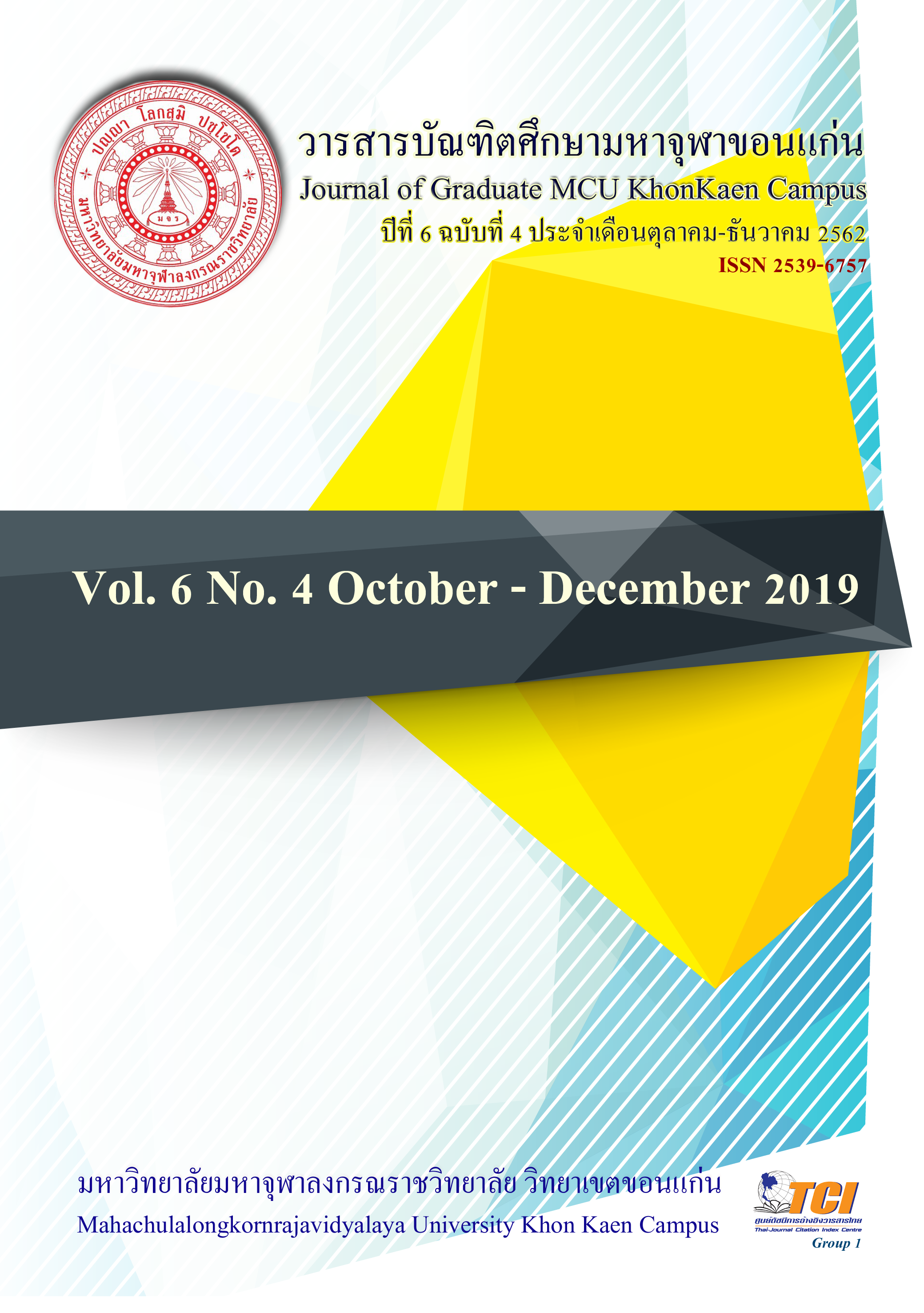Learning Management for Developing lower Secondary Students’ Morality in Social Studies Religion and Culture Essential Subject Group of Schools under Khon Kaen Municipality
Main Article Content
Abstract
The aims of this research were: to study the conditions, to compare and present the ways in the ethics learning management of the lower secondary students in the learning group of Social Studies, Religion and Culture in the schools under Khon Kaen municipality. The samples included 18 educational administrators and teachers and 178 teachers under Khon Kaen municipality, selected by Krejcies and Morgan’s simple sampling. The research tools were: a questionnaire and the statistics used in this research were: Frequency, Percentage, Standard Deviation, t-test (independent) and f-test.
The research results were as follows:
1) The overall statistic score of the ethics learning management of the students was at a high level. In each aspect consideration, the highest score was that of: 1) Training and Teaching, followed by 2) Learning Management, 3) School Activity Organization and 4) Environmental Management respectively.
2) Based on the comparison of ethics learning management of the students, the comparative statistic scores were indifferent in the overall perspective, but the scores of the aspects of Learning Management were differentiated with the statistical significance level of. 05. The scores of working experiences of the educational administrators and teachers in overall were not different. In the aspect of Training and Teaching, the scores were different with the statistical significance level of .05. Those with five years working experience showed their less skills in learning management of ethics than those with 11 years working experience.
3) The ways of ethics learning management of the students can be done as follows: 3.1) Training and Teaching, the students must be taught to well behave, have disciplines, honesty to oneself and others, and physical, mental and intellectual development; 3.2) School Activity Organization, a variety of activities should be managed in order for keeping students to exchange their knowledge; 3.3) Environmental Management, the surrounded environment should be managed properly to increase the instructional efficiency, to suite learning, to create the learning resources within the schools; the Buddhist proverbs should be hung on the trees; 3.4) Learning Management, the learning models should be used such as Problem Based Learning, Project Based Learning or Head Hands Harts etc.
Article Details
References
school administrators under the Office of Khon Kaen Primary Education Area 1. Graduate School :
Mahachulalongkornrajavidyalaya University.
Phrakhru Prathipthamat (Chutin Tharo). (2012). Organizing activities to promote morality and ethics of students. Khlong
Charoen Rat School Bang Sao Thong District Samut Prakarn Province. Philosophy thesis. Graduate School:
Mahachulalongkornrajavidyalaya University.
Phrakhru Winaithorn Sudjai Chitamano (Khanpradoem) (2017). AnApplication Of Six Principles Of Saraniyadhamma To
The Administration Of Bhuddhist General Education Schools In Kalasin Province. Graduate School : Mahamakut
Buddhist University.
PhraMahaNipitphon Chirawattano (Wong Anu). (2017). Learningmanagement for developing ethical learners In the
study of social studies, religion and culture at the upper secondary level, Muang District, Nong Khai Province.
Master of BuddhistThesis, Social Studies Teaching, Graduate School: Mahachulalongkornrajavidyalaya University.
PhraWeera Sriphrom. (2011). Problems in organizing moral development activities in schools under the Office of
Buriram Primary Educational Service Area 3. Master's thesis Graduate School: Buriram Rajabhat University.
Krejcie, R. V. & Morgan, D. W. (1970). Determining Sample Size for Research Activities. Educational and Psychological
Measurement, 30(3)

